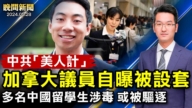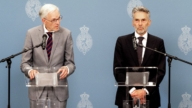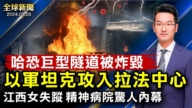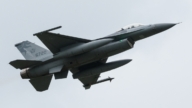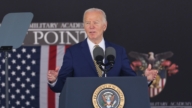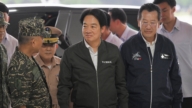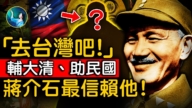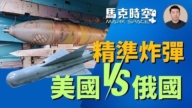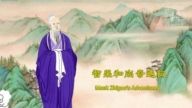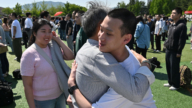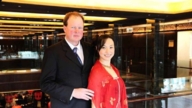【新唐人2013年11月06日訊】日、俄兩國11月2號在日本東京舉行了首次的「二加二戰略會談」,雖然沒有明確點名,但外界猜測,這是顯示雙方在共同應對中國威脅上的合作姿態。日、俄建交57年,因領土糾紛,關係停滯在尚未簽署《和平友好條約》階段,也因此,這次的歷史性雙方會談,格外引人注意。
日本的外務相岸田文雄、防衛相小野寺五典,俄羅斯的外交部長拉夫羅夫和國防部長紹伊古,3號在東京出席俄、日「二加二戰略會談」。雙方一致同意,日本海上自衛隊與俄羅斯海軍在此之前實施的搜索救援聯合訓練,將被擴展至反恐、打擊海盜等更廣泛領域,強化在安保領域的合作。
繼美國和日本10月初發表的外長、國防部長會談共同聲明,表示「歡迎行使集體自衛權」之後,接著是澳大利亞,俄羅斯是第三個與日本舉行外交部長和國防部長會談的國家。
有評論指出,日本首相安倍晉三能夠說服俄羅斯總統普京,讓俄羅斯外長和防長到東京,並展開有關問題的談判,已經證明安倍在普京心裡的份量,雙方一拍即合的達成具有戰略性形式的會談方式。
旅美政論家伍凡:「俄羅斯和日本兩國的外交部長和國防部長舉行了會談,這是歷史上從來沒有過,他在二加二會議上,不是來談領土問題,也不是談兩國之間糾紛的問題,而是談兩國怎麼樣合作,建立一個亞太安全體系,就把中國丟在一邊,把中國排除在外。這就非常明顯了,就是要針對中共,這個局勢發展,我想是出乎很多人的意料,甚至是出乎於中共的意料。」
俄羅斯這次提出了建立亞太新安全結構的概念。不過,俄羅斯沒有選擇在北京,而是在東京向外界宣佈了這一新外交概念。中共喉舌媒體一面倒的否認「日俄會談,盯著中國」這件事情,《新華網》的新聞標題寫著,「日本企圖借『2+2』會談拉攏俄羅斯牽制中國遭拒」,還說日本四處「公關」拉攏屢遭碰壁。
根據《美國之音》廣播電臺的報導,俄羅斯外長拉夫羅夫在會談結束時,除了更正面評價了日本首相安倍的積極和平主義主張之外,他還透露了雙方討論的一些細節。
俄羅斯外長拉夫羅夫説:我們討論了必須開始對話,在亞太地區建立新的,不帶集團性質,並有多方參加了新安全結構。這個安全結構應該以安全不能分開為原則,同時照顧所有各方的利益。我們認為,日本參加有關建築亞太安全體系的多方對話,將與落實安倍先生政府所推行的積極和平主義的政策處在同一個軌道上。
不僅如此,俄羅斯國防部長紹伊古也透露,包括俄、日兩軍總參謀部在內的兩國軍方未來將更多接觸和互動。
紹伊古説:我們這次還決定,包括國防部長在內的兩國軍方領導人將進行定期互訪。
「英國廣播公司《BBC》」也分析報導了這次兩國的會談,是日、俄加強安全合作以牽制中國。
《美國之音》表示,同中國相比,俄羅斯對日本較少戒心。俄羅斯更歡迎日本投資。日本福島核事故之後,一些帶有民族主義色彩的俄羅斯政治人物甚至提出日本人是模範公民,歡迎日本居民去西伯利亞定居的主張。
日俄「二加二戰略會談」內容包括日本防衛政策、日俄防衛合作、導彈防禦體制、中國與朝鮮問題以及敘利亞局勢等。
採訪/朱智善 編輯/黃億美 後製/郭敬
Japan-Russia 2-Plus-Two Meeting Aims At China
On November 2, Japan and Russia held its first “two-plus-two
strategic talks" in Tokyo.
Observers speculate that it shows the two sides’ cooperation
in dealing with emerging Chinese threats.
Japan and Russia have a 57-year relationship.
Because of territorial disputes, they never signed
a postwar peace treaty.
Thus the historical meeting draws extreme concerns of many.
Japanese Foreign Minister Fumio Kishida, Defense Minister
Itsunori Onodera and their Russia counterparts, Serge Lavrov
and Sergei Shoigu attended the meeting.
The two nations agreed to develop search-and-rescue
exercises, conduct joint anti-terrorism and counter-piracy
exercises between Japan’s Maritime Self-Defense Force
and the Russia Navy, and enhance security cooperation.
It is the third foreign and defense ministers’ framework
for Japan following those with the US and Australia.
The US and Japan jointly made a statement regarding
security cooperation in a meeting held in early October.
Commentators say that Japanese Prime Minister Shinzo Abe
had persuaded Russian President Vladimir Putin to send its
foreign and defense ministers to attend a meeting in Tokyo
and negotiate relevant issues, indicating that Abe is important
in Putin’s view, thus the two sides easily set the form
of the strategic talks.
Wu Fan, US-based political commentator: “The US-Japan
foreign and defense ministers’ talks is unprecedented.
In the 2+2 meeting, territorial disputes weren’t mentioned,
but there was talk about bilateral cooperation
and establishment of an Asia-Pacific Security system.
The system excluded China, and is obviously aimed at China.
This result is unexpected, it is even beyond
China’s imagination."
This time Russia suggested an establishment of a new policy
within the Asia-Pacific Security framework.
However, Russia didn’t announce the new
diplomatic policy in Beijing, but rather in Tokyo.
The Chinese state-run media denied the Japan-Russia talks
are aimed at China.
Xinhua website published an article “Japan, Russia
hold ‘two-plus-two’ meetings which repeatedly hit the wall."
Voice of America (VOA) reported that Russian foreign
minister Lavrov talked positively at the end of the meeting
about Abe’s idea of making Japan a proactive contributor
to peace.
Lavrov also revealed some details about their bilateral talks.
Lavrov said this is precisely why Russia has been pressing for
the establishment of a new architecture in the Asia-Pacific
Region that would rely on non-bloc principles and the idea
that no country shall maintain its own security
at the expense of others.
In addition, Russian Defense Minister Sergei Shoigu
said that the two sides will have more contact and interaction,
including the General Staff’s of Armed Forces.
Shoigu added that the two sides’ leaders, including defense
ministers will meet regularly in the future.
The BBC Chinese website reported that the Japan-Russia
talks are to strengthen security cooperation to restrain China.
VOA said that compared with China,
Russia has less wariness to Japan.
Russia welcomes Japanese investment more.
After the Fukushima nuclear accident, some Russian
politicians even praised the Japanese as model citizens.
They welcome the Japanese to live in Siberia.
Japan-Russia “two-plus-two" talks include Japanese
defense strategy, Japan-Russia defense cooperation,
the missile defense system, the China-North Korea issue,
as well as the Syrian situation.






